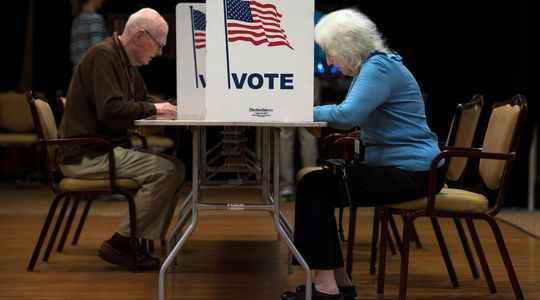This is a (long) awaited result. He was known on Friday November 11, three days after the midterms ballot, Tuesday November 8. Democratic Sen. Mark Kelly won re-election in Arizona, putting President Joe Biden’s party just one seat away from retaining a majority in the upper house. The former astronaut beat his Republican opponent Blake Masters in this southwestern state, assured three television channels.
The wait has led to its share of suspicions. On Friday evening, Donald Trump wrote on his social network that certain electoral machines had failed in Arizona, and that the result was “a scam and electoral fraud”. “Redo the election!”, he urged in a conspiratorial protrusion which he is used to.
Republican officials had as early as Tuesday, November 8, begun to doubt the integrity of the midterm election after the reporting of these technical problems. About 20% of polling places in Maricopa County, Arizona, encountered difficulties, according to local officials, who assured that it would not affect the vote. This technical bug prevented the machine’s scanner (also called tabulator) from reading the ballot. Voters were therefore invited to slip their ballot into the slot, on the side of the machine, or to vote in another office, as specified by TF1. In 2020, already, the counting of the result had been very tight in Arizona between Donald Trump and the winner Joe Biden, concentrating a large part of the accusations of electoral fraud.
Mark Kelly’s victory therefore brings the number of Democratic senators to 49. They only need to win an additional seat to keep control of the upper house. They would find themselves, like the Republican Party, with 50 seats and but could then use the vote of Vice-President Kamala Harris in order to decide between the ties, as provided for in the Constitution. Two seats are still to be filled: in Nevada, where the count continues, and in Georgia, where a second round is scheduled for December 6 because none of the three candidates has reached the necessary 50% mark. The control of the upper house therefore risks being played out in this State of Georgia, which has become a hot spot on the American electoral map. In 2000, the wait to find out which party would win the majority in the Senate lasted for weeks, due to the holding of a second ballot in Georgia.
The logistical challenge
In the United States, the polls are complex to organize: there are mixed ultra-urban areas and extremely rural regions. Each of the 50 states has its own rules and can adapt the way its population expresses its voice. “If Florida can count 7.5 million ballots in 5 hours, how is it possible that some states take days to count 2 million?” Republican Senator Marco Rubio tweeted.
Some Americans vote on machines, others with paper ballots; some vote on the spot, others remotely, weeks in advance or on polling day. Postal voting, widespread since the 2020 presidential election, organized in the midst of a pandemic, complicates the situation. The American ballots are already long to count: citizens answer a multitude of questions, to elect representatives, prosecutors or participate in referendums.
And the votes cast by correspondence are even more so, because they require preparation and can arrive several days after that of the election. Ohio and Alaska even count those who arrived up to ten days later. In many states, election officials are not allowed to start counting them in advance anyway. The additional time needed to take them into account regularly fuels conspiracy theories, as was the case in 2020, when the results of the presidential election between Joe Biden and Donald Trump were only known after four days.
If in doubt, a recount is required. Twenty states have laws that automatically order it if the margin between two candidates is too small. In 2008, an election for a senatorial seat in Minnesota gave rise to an epic legal battle: the results were known eight months after the election.
The United States remains marked by the presidential duel of 2000 and a long wait of 36 days. At the end of an ultra-tight race in Florida against George W. Bush, Al Gore had asked for a manual count, which was the start of a battle finally decided by the Supreme Court in December. At the heart of the controversy were often old machines, used to read punched cards, whose holes had sometimes been badly drilled.
In the case of “close elections, especially if they involve the control of a party on the American Senate, the disinformation will worsen”, estimated with AFP Rick Hasen, professor and director of “Safeguarding Democracy Project” at the University of California, Los Angeles (UCLA) School of Law. “It has become common now among Donald Trump supporters to believe that election theft in the United States is common, despite all the reliable evidence to the contrary,” he warned.
